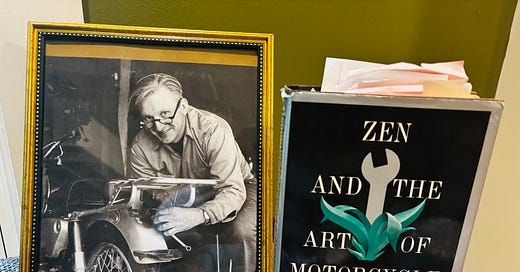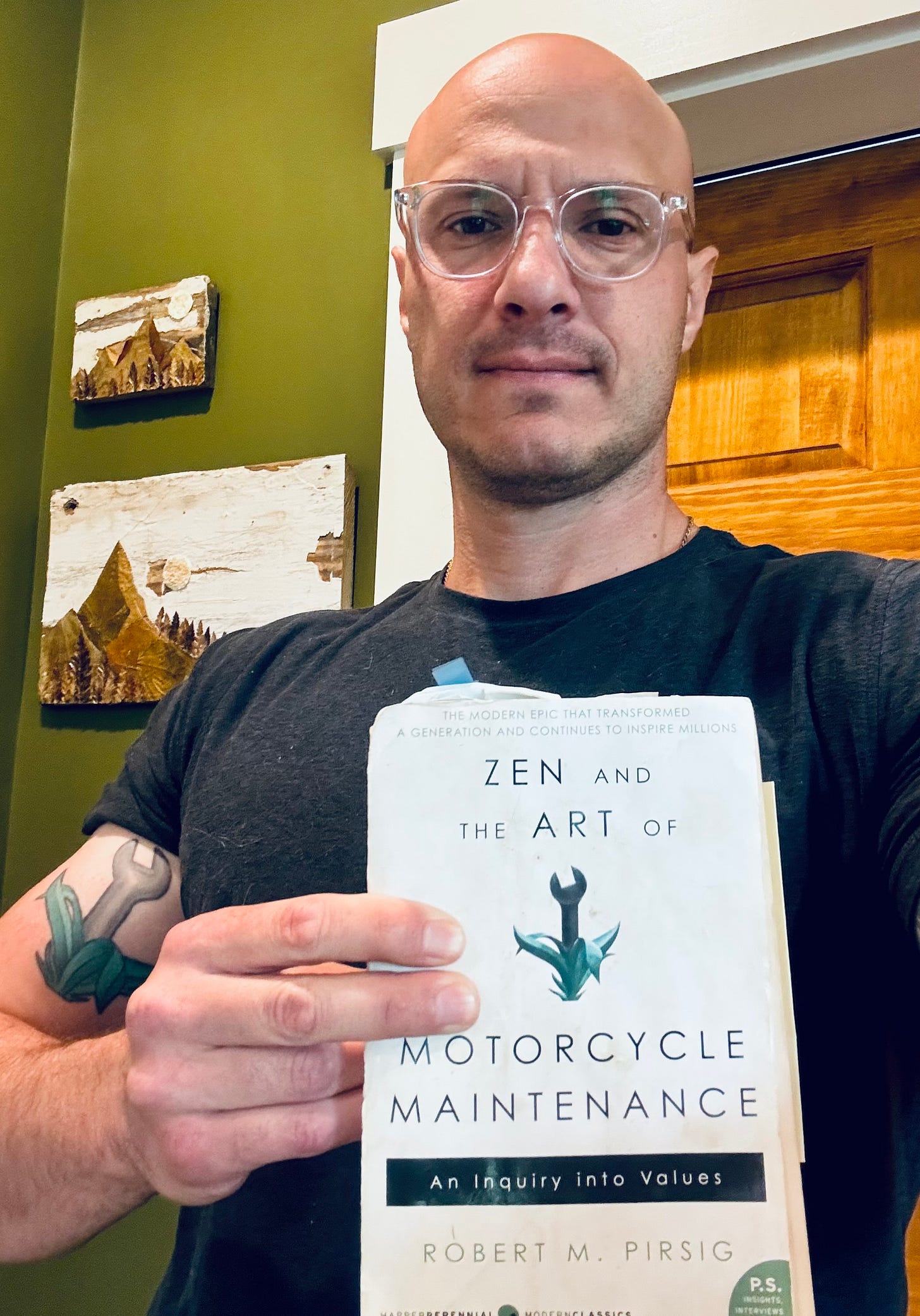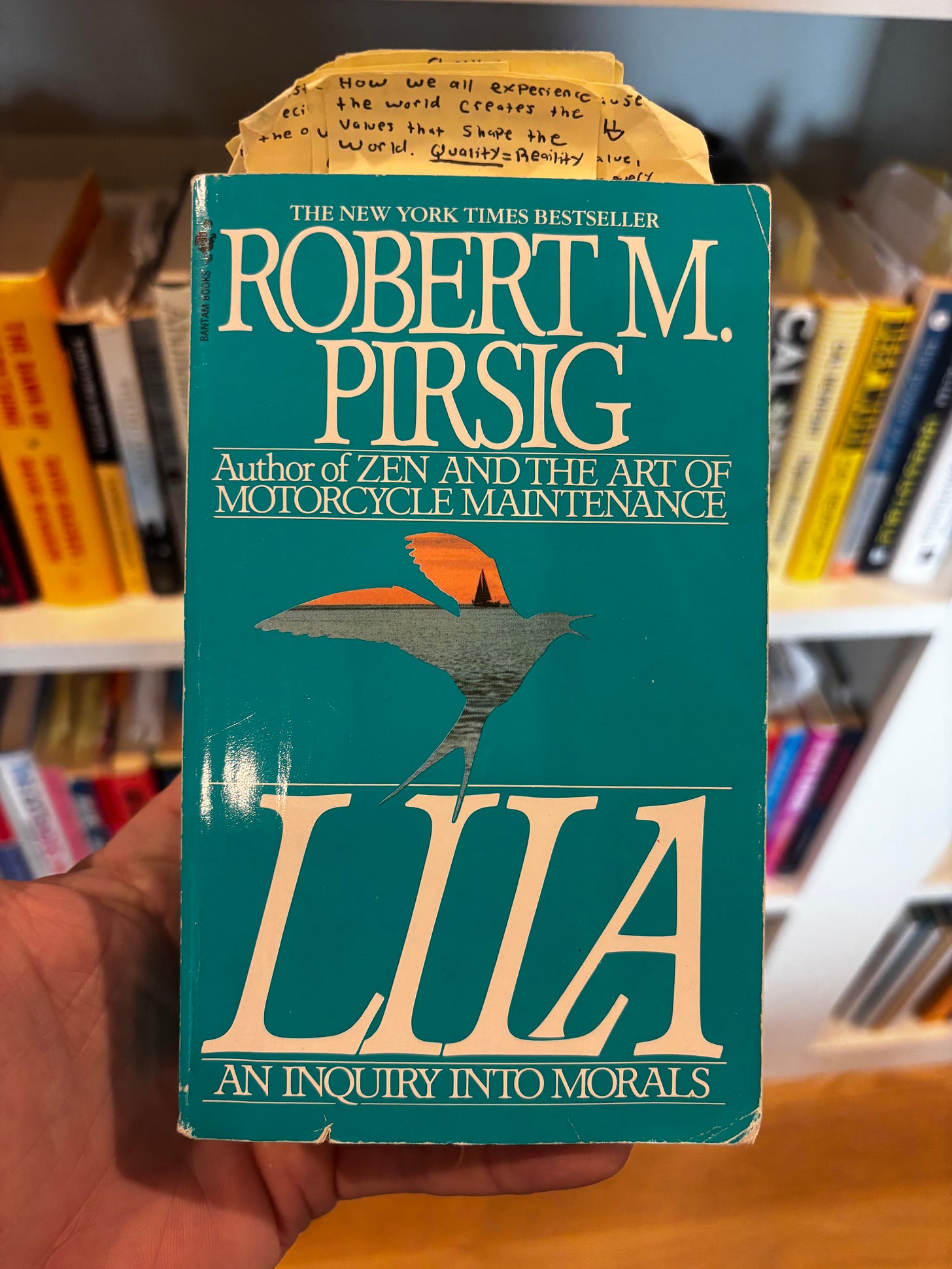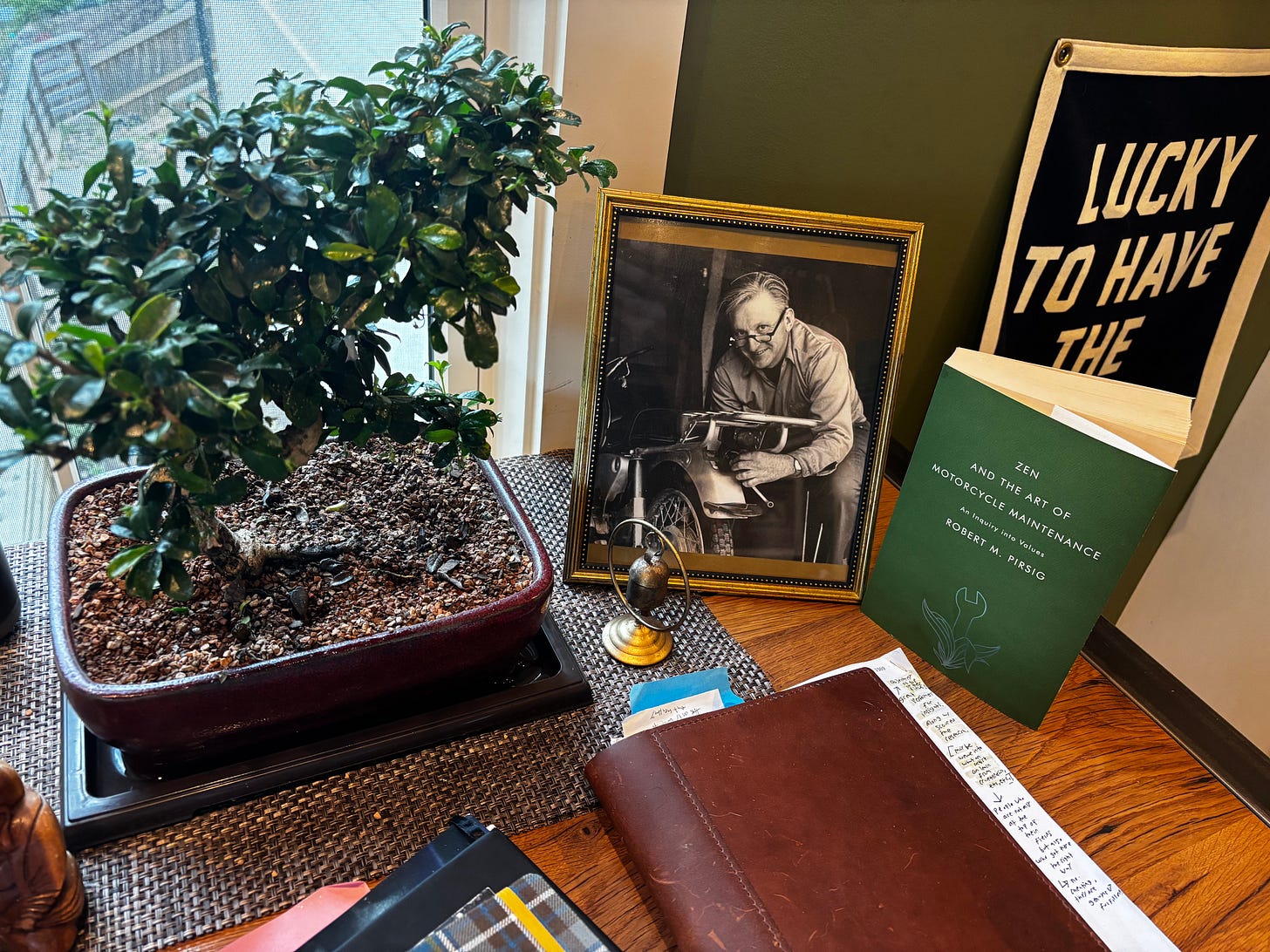Remembering Robert Pirsig on the 8th Anniversary of his Death
The author of Zen and the Art of Motorcycle Maintenance
Robert Pirsig died on this day eight years ago. His work has had a profound impact on me, and I wanted to share some words about it along with a few images.
I first read Zen and the Art of Motorcycle Maintenance as an undergraduate student.
It was the first book in which I truly lost myself; it opened me up to new ways of thinking and being, and it spurred an interest in reading and intellectual life more broadly. At the time I was headed toward business school. But after reading ZAMM, I decided I’d study philosophy, economics, and psychology instead.
The book also led me to adopt a philosophy of life around what Pirsig calls “Quality,” a state where the difference between subject and object fades away. Quality emerges when you care deeply about what you are doing—and it’s where genuine excellence, meaning, and love reside.
The cover art from ZAMM is tattooed on my arm.
Lila, Pirsig’s second book, further builds out the idea of Quality, and argues for its central importance in personal and societal progress. Though Lila is not nearly as well known as Zen and the Art of Motorcycle Maintenance, I found it every bit as profound.
It was while reading this book that I decided I wanted to be a writer. (It was also while reading this book that I learned from Pirsig a note-taking strategy that I still use to this day in all my substantial writing projects.)
In the margins of my first copy of Lila, I have the note written: “Quality is love.”
Now, my daughter is named Lila.
I distinctly remember after reading Pirsig’s books my roommates and friends started giving me a hard time because I wasn’t as interested in partying or drinking. What I wanted to do was read more and write. I’ve probably read each one at least five more times since then.
People often ask me how I write books. It’s a long process—and a big part are the ideas I collect on notecards for years, sometimes decades. I organize the notecards by topic. When it’s time to write a book, I take out the notecards, and choose which ones I think will be relevant. Next, I arrange and rearrange them until I have a flow that makes sense. It starts with chapters and runs all the way down to paragraphs—a method that comes from Pirsig.
It’s not so much the mechanics of this process that make it special, but the way you are always shaping the world and making connections between observations and ideas. It turns writing into more than something that happens at a desk; it becomes a way of being in the world.
The book I am currently writing is about excellence. It draws heavily on some of Pirsig’s core ideas—most notably, the life force each of us carries toward our own version of greatness, toward our own version of Quality.
On my writing desk sits a photograph of Pirsig and a special edition of Zen and the Art of Motorcycle Maintenance.
Whenever I sit down to write, I am reminded to bring my own Quality to the work, and also of the lineage my work is part of.
Pirsig taught me about the power of non-dual thinking: that classical and romantic, science and art, and reason and mysticism need not be opposed.
He taught me about the value of focus, intimacy, caring deeply, and living one’s values. Out of that, writes Pirsig, emerges a special kind of Quality: “Working on a motorcycle, working well, caring, is to become a part of the process, to achieve an inner peace of mind.”
For Pirsig, being intimately engaged in the process of something was the goal. For example, what makes a sculpture have Quality? It isn’t the stone, and it’s not the sculptor. It’s what happens between them, out of which the sculpture emerges. “Between the subject and the object lies the value,” he notes in “Lila.” “This value is more immediate, more directly sensed, than any ‘self’ or ‘object’ to which it might be later assigned.” The more Quality involved in the process, the more beautiful the result.
Pirsig also showed me that just because someone experiences mental illness does not make them any less strong or thoughtful or incisive.
Shortly after Pirsig died in 2017, I was asked to write his obituary for New York Magazine. I have been honored to take on some amazing writing assignments, but this one, from early in my career, holds a special place in my heart.
To be asked to memorialize my intellectual hero, the person who turned me onto writing and excellence and so many of the other topics I care about, was a full circle moment that still brings bittersweet feelings to my heart.
Here’s how I concluded the piece. It seems fitting to end on here too:
The best way to honor Pirsig is to read his work. So I’ll leave you with another of my favorite quotes. “To live for some future goal is shallow. It’s the sides of the mountain that sustain life, not the top … The only Zen you find on the top of the mountains is the Zen you bring up there.”









Gosh…this essay took me back over 40 years😊Scrolling down sometimes leads to interesting places.
ZAMM meant a great deal to my roommate at uni in the 1980s; no tattoos involved, but I recall stitching a floor cushion for her with that central motif and a quote ( beginning…’and what is good…’) She gave me a copy of the book when my son was born. Time to read it again, I think😊
Hi Brad, it was nice to read your post. I was also very influenced by the ideas in ZAMM. I had to read it 3 times over the course of 20 years to understand it, but when I did...! It's a book I go back to still and take in the fundamental insights that came from Robert and his dissecting knife.
The reason I was looking for Robert Pirsig stuff is because i am watching a video about Federico Faggin and his views about quantum information. It's awesome. His ideas overlap very very well with what Robert was saying in ZAMM. Really its incredible and I was wondering whether Federico knew about Robert and his writings. Robert talked about Quality as the meeting point of science and 'mojo' and Federico also does, but goes a step further, proposing a way of connecting the two sides of Quality, which Robert didn't have a chance to.
I haven't found out yet whether Faggin knew about Pirsig but in the meantime , if you're interested, the video is here: https://www.youtube.com/watch?v=0FUFewGHLLg